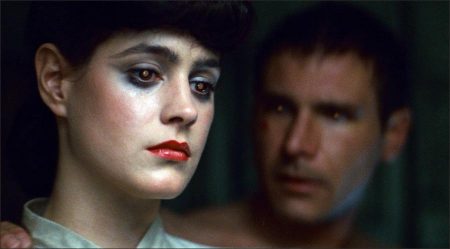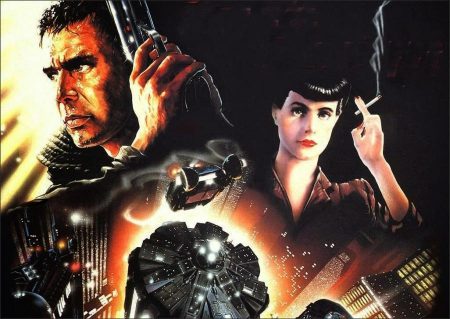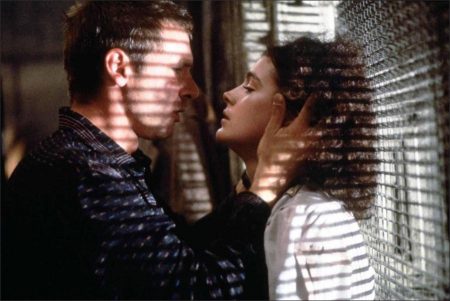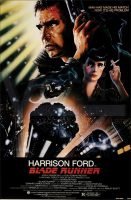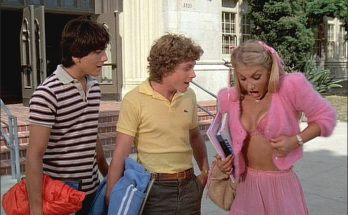Taglines: Man has made his match… Now it’s pis problem.
Blade Runner movie storyline. In the futuristic year of 2019, Los Angeles has become a dark and depressing metropolis, filled with urban decay. Rick Deckard, an ex-cop, is a “Blade Runner”. Blade runners are people assigned to assassinate “replicants”. The replicants are androids that look like real human beings. When four replicants commit a bloody mutiny on the Off World colony, Deckard is called out of retirement to track down the androids.
As he tracks the replicants, eliminating them one by one, he soon comes across another replicant, Rachel, who evokes human emotion, despite the fact that she’s a replicant herself. As Deckard closes in on the leader of the replicant group, his true hatred toward artificial intelligence makes him question his own identity in this future world, including what’s human and what’s not human.
Blade Runner is a 1982 American neo-noir science fiction film directed by Ridley Scott, and starring Harrison Ford, Rutger Hauer, Sean Young, and Edward James Olmos. The screenplay, written by Hampton Fancher and David Peoples, is a modified film adaptation of the 1968 novel Do Androids Dream of Electric Sheep? by Philip K. Dick.
The film depicts a dystopian Los Angeles in which genetically engineered replicants, which are visually indistinguishable from adult humans, are manufactured by the powerful Tyrell Corporation. The use of replicants on Earth is banned and they are exclusively utilized for dangerous or menial work on off-world colonies. Replicants who defy the ban and return to Earth are hunted down and killed (“retired”) by special police operatives known as “Blade Runners”. The plot focuses on a group of recently escaped replicants hiding in L.A. and the burnt-out expert Blade Runner, Rick Deckard (Harrison Ford), who reluctantly agrees to take on one more assignment to hunt them down.
Blade Runner initially polarized critics: some were displeased with the pacing, while others enjoyed its thematic complexity. The year following its release, the film won the prestigious Hugo Award for Best Dramatic Presentation. Blade Runner underperformed in North American theaters, but has since become a cult film. Hailed for its production design, depicting a “retrofitted” future, it remains a leading example of the neo-noir genre.
It brought the work of Philip K. Dick to the attention of Hollywood and several later films were based on his work. Ridley Scott regards Blade Runner as “probably” his most complete and personal film. In 1993, the film was selected for preservation in the United States National Film Registry by the Library of Congress as being “culturally, historically, or aesthetically significant”. Blade Runner is now regarded by many critics as one of the all-time best science fiction films.
About the Story
In Los Angeles in November 2019, ex-police officer Rick Deckard (Harrison Ford) is detained by officer Gaff (Edward James Olmos) and brought to his former supervisor, Bryant (M. Emmet Walsh). Deckard, whose job as a “Blade Runner” was to track down bioengineered beings known as replicants and “retire” (a euphemism for killing) them, is informed that four have come to Earth illegally. As Tyrell Corporation Nexus-6 models, they have only a four-year lifespan and may have come to Earth to try to extend their lives.
Deckard watches a video of a Blade Runner named Holden administering the “Voight-Kampff” test designed to distinguish replicants from humans based on their emotional response to questions. The test subject, Leon (Brion James), shoots Holden after Holden asks about Leon’s mother. Bryant wants Deckard to retire Leon and the other three replicants: Roy Batty (Rutger Hauer), Zhora (Joanna Cassidy), and Pris (Daryl Hannah). Deckard initially refuses, but after Bryant ambiguously threatens him, he reluctantly agrees.
Deckard begins his investigation at the Tyrell Corporation to ensure that the test works on Nexus-6 models. While there, he discovers that Dr. Eldon Tyrell’s (Joe Turkel) assistant Rachael (Sean Young) is an experimental replicant who believes herself to be human. Rachael has been given false memories to provide an “emotional cushion”. As a result, a more extensive test is required to determine whether she is a replicant.
Events are then set into motion that pit Deckard’s search for the replicants against their search for Tyrell to force him to extend their lives. Roy and Leon investigate a replicant eye-manufacturing laboratory and learn of J. F. Sebastian (William Sanderson), a gifted genetic designer who works closely with Tyrell. Rachael visits Deckard at his apartment to prove her humanity by showing him a family photo, but after Deckard reveals that her memories are implants from Tyrell’s niece, she leaves his apartment in tears. Meanwhile, Pris locates Sebastian and manipulates him to gain his trust.
While searching Leon’s hotel room, Deckard finds a photo of Zhora and a synthetic snake scale that leads him to a strip club where Zhora works. Deckard kills Zhora and shortly after is told by Bryant to also retire Rachael, who has disappeared from the Tyrell Corporation. After Deckard spots Rachael in a crowd, he is attacked by Leon, but Rachael kills Leon using Deckard’s dropped pistol. The two return to Deckard’s apartment, and during an intimate discussion, he promises not to hunt her; as she abruptly tries to leave, Deckard physically restrains her, forcing her to kiss him.
Blade Runner (1982)
Directed by: Ridley Scott
Starring: Harrison Ford, Rutger Hauer, Sean Young, Daryl Hannah, Joanna Cassidy, Brion James, Joe Turkel, William Sanderson, Kevin Thompson
Screenplay by: Hampton Fancher, David Webb Peoples
Production Design by: Lawrence G. Paull
Cinematography by: Jordan Cronenweth
Film Editing by: Marsha Nakashima, Terry Rawlings
Costume Design by: Michael Kaplan, Charles Knode
Set Decoration by: Linda DeScenna, Leslie McCarthy-Frankenheimer, Thomas L. Roysden, Peg Cummings
Art Direction by: David L. Snyder
Music by: Vangelis
Distributed by: Warner Bros. Pictures
Release Date: June 25, 1982
Visits: 128
